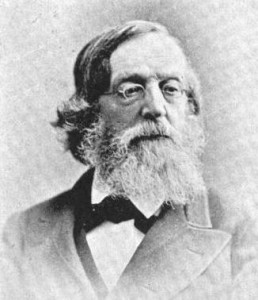My last post in this series ended in somewhat of a stalemate. I began by explaining how we all read the Bible/Tradition/Experience/Reason through a different Interpretive Principle, which is itself shaped by a unique configuration of the four influences just cited. I concluded by expressing my skepticism as to whether or not any of us is holding a “trump card” that can validate our Interpretive Principle as supreme. We all like to think we’re holding that card, but just try playing it against someone who doesn’t share your Interpretive Principle. They’ll almost certainly cry foul. So the question remains: How do we resolve disputes over how to best read a text/tradition/experience/argument? Is resolution even possible? If so, what might that look like?
Let me begin by illustrating something I neglected to mention in my previous posts–the human factor. That is, why are some people drawn toward a particular Interpretive Principle and not others? I teach screenwriting at various film schools a few times each year. And when it comes to characters, I talk about them having three dimensions. Specifically, I mean that the “self” is shaped by three factors: physiology, psychology and sociology. You could break this down into just two factors–Nature and Nurture, with physiology and psychology falling on the Nature side and sociology on the Nurture side. And I guess you could go one step further and narrow it down to a single factor–physiology–seeing as every experience, including “spiritual” experiences, are ultimately mediated through the body. However, I like to be as specific as possible. (I also like the number 3!) So if we include these factors into my previous diagrams, here’s what we’re looking at:
Our tendency to grant authority to one interpretive principle over another, one tradition over another, one set of arguments over another, one set of experiences over another or even one set of biblical texts over another is largely determined by our physiological and psychological makeup, the environment in which we were raised, the circumstances in which we currently find our selves and our place in history. All of these factors predispose us toward seeing things in one way versus another. So once again, unless these factors completely overlap (and they never do, not even in the same family), our Interpretive Principle is going to come out looking a little different from everyone else’s.
Unfortunately, rather than solve the problem I identified at the outset, it seems like this merely complicates things even further. So where do we go from here? Before I attempt to answer that question, let me start by stating a few things that I am NOT saying:
- That communication is impossible: Of course we can communicate. We’re doing it right now. But even this simple form of communication is passing through a complex web of interpretive filters as you consciously and unconsciously sift through the text, subtext and context of what I’m writing. You may think you have discerned my authorial intent, but what if I’m not even certain about my ultimate intentions in writing this? Now we have a problem.
- That we can’t know anything: Of course we can know things. But we can’t know everything, and we can’t know anything with certainty. If quantum physics has taught us anything, it’s that nothing in the universe is as it appears to our finite nervous systems. This should inject us with a healthy dose of humility.
- That objective reality doesn’t exist: This is a tough one. I’m tempted to say that of course objective reality exists, but even if it does, we can never know it objectively, because as finite beings, our perspective on that reality is inherently limited. But when I attempt to define the terms “objective” and “reality,” things get a little muddy. We can blame quantum physics again here, as well as Einstein. And neuroscience. And Richard Rorty. Rather than drift off into an extended tangent though, let’s just say “it’s complicated.”
So communication is possible (but messy), we can know things (but not absolutely), and objective reality exists (after a fashion). Taking these factors into account, it seems that the first thing we need to relinquish is our desire for certainty. Of course, the desire for certainty is almost always a desire for control, which is itself the product of fear. So the question we should really be asking is, what are we afraid of?
Second, once we set certainty (and fear) aside, as well as the competitive spirit they tend to create, I think it is possible to have healthy dialogues about how and why we configure the various influences on belief formation (Scripture, Tradition, Reason and Experience) the way we do. And rather than merely reduce such dialogues to subjective opinion, I think we can root our critique in methods that are both observable and measurable. For example, if I had to sketch out my own interpretive principle, it would look something like this:I realize that as someone raised within the evangelical tradition, the Bible should be right up front. But I arrived at this configuration by reflecting not on how things are supposed to work but on how I actually approach problem-solving. None of us begins life with the Bible. Rather, we all begin with some sort of experience–and it could even by our experience of reading the Bible, a philosopher or theologian or Church history–that triggers an emotional/intellectual response which puts us in a state of pondering. As a result, we consult with philosophers, theologians, Church teachings and the Bible, itself, to see what sort of light they can shed on the issue.
So to my way of thinking, Experience naturally comes first. The Bible, Tradition and Reason become interpretive tools that help us make sense of our experiences. How you configure these three tools in terms of an interpretive hierarchy is open to debate, but my personal tendency is to go from Experience to Reason and then to either the Bible or Tradition. Of course, this process is rarely as systematic as I’ve laid out. More often it’s like multiple sets of waves smashing together with things only becoming clear once the waves recede. I know the waves are going to return again, but these brief moments of clarity give me enough confidence to at least take the next step. And remember, this approach isn’t premeditated. It’s merely a description of how things typically work in my life.
At the same time, it seems to me that we can observe a similar process at work throughout the Bible. Take the Apostle Paul, for example. As a good Jew, the Torah and Tradition were his primary authority, his interpretation of which led him to believe that Christians should be tracked down and arrested. But his encounter with Christ on the road to Damascus completely obliterated this way of thinking. He was forced to reinterpret the Scriptures, Reason and Tradition in light of this experience, and a large portion of the New Testament reflects his considerable efforts to do just that. The other disciples are no different. It was their relationship with Christ–an experience–that utterly transformed their reading of Scripture, Tradition, Reason and even other experiences, causing them to arrive at a new Interpretive Principle–the Risen Christ. We see this same dynamic at work throughout the Old Testament as well, with Abraham, Moses, Jacob and so many others having their Interpretive Principles rocked by an extraordinary experience.
If you want to tread onto slightly less controversial ground, change the context from religion to pet ownership. A few years ago we decided to get a dog, a Boxer, to be specific. In striving to deal with the incorrigible mutt, I went through much the same process as I described above:
I began with a particular Interpretive Principle: “We are a dog family.” But this ran smack into an Experience–an encounter with one of the most stubborn animals I’ve ever met. In my efforts to get him to behave, I attempted to apply Reason and logic. When these failed utterly, I turned to Tradition (primarily “The Dog Whisperer”) and an authoritative Text (“A Member of the Family” by Cesar Millan, a book which my puppy–no word of a lie–found beside my bed and then promptly shat upon). When these resources all failed to produce anything close to the results for which we had hoped (and I blame myself for this, not Cesar), I was forced to revise my Interpretive Principle (we are NOT a dog family, as it turns out) and sell the dog (for a slight profit). I don’t mean to trivialize the issue with this example, merely transplant the mechanics of belief formation to another context so we’re able to see them without our hackles raised quite so high.
I’m going to end this post now not because I think I’ve necessarily solved anything but because it’s lunchtime and I’ve already gone about 500 words over my intended length. As I stated at the outset, I don’t claim to have a silver bullet here; I’m merely thinking out loud. So any input or critique is greatly appreciated. But hopefully these posts at least prompt some helpful reflection on why and how we hold the beliefs that we do as well as provide a framework for more fruitful theological discussions.











